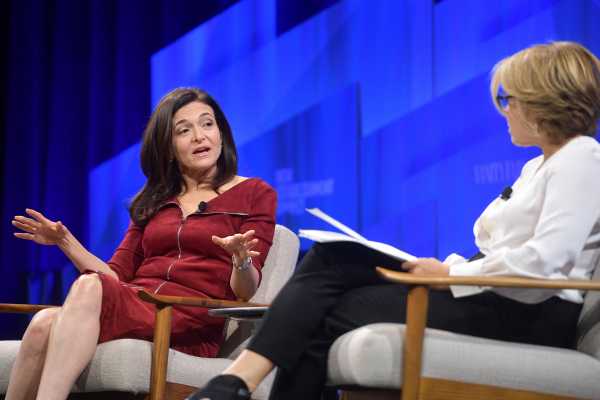
Amid the coronavirus crisis, millions of Americans are working from home and trying to balance their home lives. And women, specifically, are bearing the brunt of the labor.
New research from Lean In, the women’s organization founded by Facebook COO Sheryl Sandberg, examines how women working from home are faring during the Covid-19 pandemic compared with men. Their findings, at least to many women in that situation, are likely unsurprising: Women with full-time jobs, a partner, and children report spending a combined 71 hours a week on child care, elder care, and household chores — compared with 51 hours for men.
A quarter of women are experiencing physical symptoms of severe anxiety, compared with just 11 percent of men. Women of color are facing an especially tough situation: 75 percent of black and Latina women spend a combined 21-plus hours per week on housework, compared with just over half of white women; they also spend more time on child care and elder care than their white counterparts.
“We know that when things get hard, women get hit the hardest,” says Sandberg. “The double whammy of what happens in the workforce and then what happens to demands on home help has never been higher.”
This builds on previous research showing that the global pandemic has had difficult ramifications for women, especially women of color in the United States. Women make up a disproportionate amount of the essential workforce, and they’ve also been hit particularly hard by job losses. And for women who are working from home, trying to keep up with their jobs along with the day-to-day responsibilities of taking care of their families and tackling housework, the situation is unequally challenging: Women are carrying a heavier load in keeping their households running, and they’re also experiencing higher levels of stress and burnout.
I recently spoke with Sandberg about her organization’s findings, the ways women are living during the pandemic, and what can be done to make a change. (There’s not really a policy fix for long-ingrained ideas about gender roles and partners who aren’t eager to help out.) We also talked about how Sandberg balances her own responsibilities at home, and what Facebook is doing to support its employees.
Sandberg, 50, is an imperfect feminist spokeswoman. Her 2013 book, Lean In, has been criticized for having a too-narrow, overly corporate message and for overlooking the structural obstacles faced by women, specifically women of color. In 2018, Michelle Obama made waves when she declared of the “Lean In” philosophy, “That shit doesn’t work all the time!” Sandberg has since said she’s reflected on the criticism. When I mentioned the mantra’s focus on work, she pushed back, calling it a misconception and saying it’s really about equal opportunity.
There’s also the Facebook question. Sandberg has been a major player in many of the social media company’s scandals. The same week we spoke, the company agreed to pay $52 million in a settlement with content moderators who developed PTSD as a result of their work.
The controversies aside, Sandberg clearly cares about women’s issues and is passionate about the unique challenges women are facing right now. “We’re never going to get to equality in the office until we get to equality at home,” she said.
Our conversation, lightly edited for length and clarity, follows.
Emily Stewart
In many ways, this feels like a women’s crisis — women, specifically women of color, are disproportionately classified as essential workers and have higher rates of unemployment. They’re also under extreme stress, working from home and taking care of their families. What does this women’s economic crisis mean for the future of women in the economy and the workforce?
Sheryl Sandberg
The thing I’ll say is it’s all very uncertain right now, right? Whenever there is uncertainty, it’s hard to make projections, but it can be even harder when there’s more uncertainty, and there’s a ton of uncertainty right now. I do think we know, though, from [the] past, there’s never been a situation like this before, and I don’t want to pretend like I know exactly what this would be in any way, shape, or form, because I don’t think anyone does.
However, here’s what we know: We know that when things get hard, women get hit the hardest. We know that when there’s more work to be done, caregiving work, women do more of it. And so in that sense, I think we know — and we know loudly and clearly from the data we have in some of the other times — that this is the most challenging for women. This is the most challenging for women of color. The double whammy of what happens in the workforce and then what happens to demands on home help has never been higher.
We know women do the great majority of that. Our data shows women who are working full-time are doing 71 hours a week of caregiving and housework, that’s 20 more hours than their husbands. Twenty hours a week is half a job. So I think this is a moment where we need to view what’s going on through the lens of gender. We have to view it that way because there’s no other way that we’re going to make the right decisions and take care of women as they need to be taken care of.
Emily Stewart
So the concept of lean in is about work, right? Is this a moment women need to lean out a little bit?
Sheryl Sandberg
Lean In is a very strong title, and a lot of people make the mistake that “lean in” means lean into work. It doesn’t say that at all. What “lean in” says and what it believes is not that we have to lean into work all the time. It’s that women should have the same opportunities men have. We should have the same amount of opportunities to do leadership, and men should be doing half the work at home, so that women have those.
It is not meaning to work all the time, I never believed that. It is to make sure that women are given the same opportunities men have. Make sure that when a woman leads, we don’t call her bossy. Make sure that when a woman wants to do a job professionally, she is not doing a great majority of the housework and child care at home. That’s what the book was about. That’s what I believe, and that’s what I believe even more today.
Emily Stewart
Part of the issue with this is that there isn’t really a policy fix on a certain level, right? Congress can’t mandate what someone’s husband or partner does or does not do in the house. Do you have a message for partners of these women who are taking on so much extra work?
Sheryl Sandberg
It’s funny, if you go back to the original TED Talk I did, there were three sections, and one of them was make your partner a real partner. And yeah, you can’t mandate staff division or labor at home at all. But I do think our messages need to be loud and clear that that’s what needs to happen.
Obviously, we can’t decide what every couple should do or every family situation; they’re all different. But, for the most part, I think if you pull what we have with these working women, they would be very happy if they’re in a heterosexual relationship, if their partners and husbands are doing well with their kids — doing more of the caregiving, doing more of the housework in particular.
It was true before this, but this is exacerbating that. We’re never going to get to equality in the office until we get to equality at home. We’re never going to get there, because as long as women have a double shift, and men have one shift, well now women have a double-double shift. That is a cultural change that has to happen in terms of our expectations of men.
But it’s also a big change that needs to happen in terms of the relationships we have. I hope that part of the conversation we started was about that partnership at home because you can’t separate that partnership at home and what’s going on in the office.
Emily Stewart
Obviously, you have a full-time job. How are you balancing child care right now?
Sheryl Sandberg
I’m pretty lucky because my kids are older. I have two children and three stepchildren, and the oldest four are 12 and above and they can sit and do online school. We have a 7-year-old. I think for parents with kids who are even younger, that’s even much, much harder, right? My 12-year-old, she can sit in her room and do her online class, and she’s very responsible about doing it. But the 7-year-old really needs lot of help, and younger kids than that need much more help.
I’m experiencing what everyone else is experiencing at home, but I’ve never been busier. Both because there’s so much going on for Facebook, so much going on with my foundation; we’re trying to do everything we can to help. I mean, just a ton more personal philanthropy, trying to jump in on food banks and domestic violence and lots of areas where I can help. And also trying to take care of kids full time.
It’s a lot, and I realize how lucky I am. I think we really have this moment to really think about what’s happening for all the families who don’t have enough to eat. All the families whose jobs have changed in ways that I think are super, super, super difficult.
One of the best things that could happen to women would be to shift that 71 and 50 hours of housework to more like 60-60. That would be the same amount of hours, and that would hand women 10 hours. Ten hours more a week is a lot of sleep, a lot of exercise, a lot of taking care of yourself. A lot of what you need to do for your job, right? I mean, think about that shift.
Emily Stewart
At Facebook you’re also having to figure this out, how to deal with a workforce working from home. What’s the role of businesses and companies here in understanding what their employees are going through? How are you all managing at Facebook?
Sheryl Sandberg
I think we have a major role to play. So what are the things Facebook’s done? Well, I think we’re one of the first companies to send everyone home. We’ve announced we’re going to be one of the last companies to bring people back. We canceled our performance cycles — we have a performance cycle where every six months, everyone gets a rating and evaluation, feedback, and a bonus, depending on how you’re doing, which I think is a good way to run a company, right? It’s performance-based. But we didn’t want people to go home and have all the responsibilities they have with their kids home from school, taking care of parents. And so we canceled our cycle and said, we are going to pay everyone out and then above the bonus so even more than 100 percent of what the bonus would be. I think for us that was putting our money where our mouth was. We’re not just telling you to take care of yourself. We are telling you that’s more important than our regular performance cycle.
At the same time, our teams are still working and they’re delivering products, and what we tell people to do is prioritize the work, and if you can’t do it because you have responsibilities at home, let us know, and we’ll rejigger the team. And we’ve been able to do that. But I think companies have a very big responsibility right now.
Emily Stewart
To shift a little bit, obviously you also have experience in government. I’m curious how you would rate the government’s response right now to the current economic crisis.
Sheryl Sandberg
Look, I think everyone needs to do everything they can. It’s a hard time. I think the fiscal stimulus stuff that’s passed is good and, probably, more needs to be done. I’m also very focused on food availability. I’m very involved in the food bank here. I have been for a very long time. Twenty-two million kids are getting free and reduced lunch and breakfast at school. Their families now have more unemployment and lack of food.
I think state government, local government, federal government have a very, very big responsibility to make sure people’s basic needs are met. This is not a time for people to not have health insurance. This is not a time for people to not have basic nutrition. I think we all need to be really worried about that.
Emily Stewart
So as much as you say we need to be worried with what’s going on on Capitol Hill right now, it’s not clear that there will be another stimulus. It’s clear that there are plenty of people who don’t have health insurance. We don’t have any answer for that. So what happens here? Do we hope corporate America steps up? Where is its role? What’s the government’s role in fixing these problems?
Sheryl Sandberg
I think everyone has a role. The problems that existed before get exacerbated.
So let’s talk about paid leave. We’re one of the only countries in the world without maternity leave. Our record on paid leave, paying for sick leave, was low before this. And that becomes even more urgent from a corporate standpoint. I think a lot of companies talk about taking care of their employees, but we really need to make sure we’re doing that. We need that to happen.
And on a personal level, this is a time to take care of the most vulnerable and share the workload. If there were ever a time that circumstances force us to rejigger the balance of workload and home, it is now. I’m hoping that families do that. I’m hoping a lot of men will lean into helping at home. This is that chance. This is that moment. This is when it matters. This doesn’t change unless you change it in your own home.
Emily Stewart
It does seem like it’s a cultural question, or is there a policy answer here I’m not seeing?
Sheryl Sandberg
I think it’s a cultural question. I don’t think you’re not seeing it. It’s a cultural question. It’s an individual question, but something needs to give for women, right? I think we’re now in a double-double shift. The double shift before this can’t work. The double-double shift works even less.
Emily Stewart
Do you think there’s a risk, the longer this goes on, that women just start to drop out of the workforce?
Sheryl Sandberg
We’ll see. But a lot of people don’t have that opportunity — 70 percent of mothers are working because they need to. That’s not changing in a bad economic situation. That’s going to get worse. We’re going to have to make it work, work for families and work, work for mothers. We needed to do that before, and we need to do that even more. I mean, it’s government policy, it is corporate policy, and it is individual behavior.
Support Vox’s explanatory journalism
Every day at Vox, we aim to answer your most important questions and provide you, and our audience around the world, with information that has the power to save lives. Our mission has never been more vital than it is in this moment: to empower you through understanding. Vox’s work is reaching more people than ever, but our distinctive brand of explanatory journalism takes resources — particularly during a pandemic and an economic downturn. Your financial contribution will not constitute a donation, but it will enable our staff to continue to offer free articles, videos, and podcasts at the quality and volume that this moment requires. Please consider making a contribution to Vox today.
Sourse: vox.com






